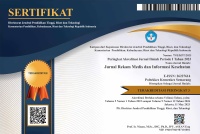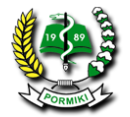Literatur Review: Pengembangan Instrumen Uji Kompetensi Pada Mahasiswa Bidang Kesehatan
Abstract
Uji kompetensi wajib diikuti oleh mahasiswa bidang kesehatan pada akhir masa studi dengan metode exit exam. Maknanya wisuda mahasiswa setelah lulus uji kompetensi. Sampai saat ini metode uji kompetensi secara nasional untuk mahasiswa D3 Rekam Medis dan Informasi Kesehatan (RMIK) maupun Sarjana Terapan Manajemen Informasi Kesehatan (MIK) secara nasional dalam bentuk multiple-choice question dengan computer-based test (CBT). Sedangkan uji kompetensi metode Objective Structured Clinical Examination (OSCE) dilaksanakan pada tingkat lokal beberapa perguruan tinggi. Mengacu pada kelulusan uji kompetensi tahun 2023, prosentase kelulusan mahasiswa sarjana terapan belum mencapai 80%. Berdasarkan hasil penelitian tahun 2023 terkait evaluasi pelaksanaan uji kompetensi dari 116 dosen RMIK-MIK, perlu dilakukan pelatihan pembuatan soal uji kompetensi (94%). Selain menjadi kewajiban dalam akhir masa studi, uji kompetensi CBT maupun OSCE juga merupakan prasayarat dalam pencapaian status akreditasi Unggul Prodi RMIK dan MIK, sehingga perlu dilakukan pengembangan instrumen uji kompetensi yang secara obyektif menilai kemampuan, keterampilan dan sikap mahasiswa RMIK-MIK sesuai dengan kebutuhan profesi PMIK.
Metode penelitian yang digunakan adalah literatur review dengan menggunakan pencarian melalui google scholar, pubmed, sciencedirect, Cochrane library dan portal garuda. Penelitian diawali dengan mencari artikel dengan menggunakan keyword pengembangan, instrumen, uji kompetensi, mahasiswa kesehatan. Kriteria inklusi yang diterapkan adalah artikel terbit 2017-2024, fulltext, dan menggunakan Bahasa Indonesia dan Bahasa Inggris.
Dari 22 literatur yang terpilih, terdapat lima langkah dalam pengembangan instrumen uji kompetensi mahasiswa bidang kesehatan: pengembangan awal instrumen dengan melakukan identifikasi pemangku kepentingan, identifikasi domain kompetensi dan kerangka kerja yang dilakukan melalui tinjauan literatur, wawancara, FGD, teknik delphi, brainstorming dengan melibatkan pakar atau ahli. Langkah kedua adalah pengembangan instrumen dan uji validitas melalui konsultasi dengan pakar atau ahli. Langkah ketiga adalah pengujian instrumen dan reliabilitas melalui uji coba dan uji statistik, selanjutnya dilakukan modifikasi dan penyempurnaan berdasarkan umpan balik uji coba. Langkah terakhir adalah implementasi instrumen untuk mengukur kompetensi mahasiswa bidang kesehatan. Pengembangan sistematis ini memastikan instrumen uji kompetensi yang dihasilkan relevan dan efektif, serta membekali lulusan dengan keterampilan yang diperlukan untuk peran profesional mereka.
Keywords
Full Text:
PDF (Bahasa Indonesia)References
AERA, APA, & NCME. (2004). AERA: Standard for Educational and Psychological Testing. American Educational Research Association.
Aldosari, B., Al-Mansour, S., Aldosari, H., & Alanazi, A. (2018). Assessment of factors influencing nurses acceptance of electronic medical record in a Saudi Arabia hospital. Informatics in Medicine Unlocked, 10, 82–88. https://doi.org/10.1016/j.imu.2017.12.007
AL-Dossary, R., Kitsantas, P., & Maddox, P. J. (2014). The impact of residency programs on new nurse graduates’ clinical decision-making and leadership skills: A systematic review. In Nurse Education Today (Vol. 34, Issue 6, pp. 1024–1028). Churchill Livingstone. https://doi.org/10.1016/j.nedt.2013.10.006
Alolayyan, M. N., Alyahya, M. S., Alalawin, A. H., Shoukat, A., & Nusairat, F. T. (2020). Health information technology and hospital performance the role of health information quality in teaching hospitals. Heliyon, 6(10). https://doi.org/10.1016/j.heliyon.2020.e05040
Camargo, de A. G., Ribeiro, E. R., & Coelho, I. C. M. (2021). Development and content validation of an instrument for evaluating competencies in Pediatric Surgery Residency. Revista Brasileira de Educação Médica, 45(3). https://doi.org/10.1590/1981-5271v45.3-20200570.ing
Claramita, M., Tuah, R., Riskione, P., Prabandari, Y. S., & Effendy, C. (2016). Comparison of communication skills between trained and untrained students using a culturally sensitive nurse-client communication guideline in Indonesia. Nurse Education Today, 36, 236–241. https://doi.org/10.1016/j.nedt.2015.10.022
Franklin, P. D., Drane, D., Wakschlag, L., Ackerman, R., Kho, A., & Cella, D. (2022). Development of a learning health system science competency assessment to guide training and proficiency assessment. Learning Health Systems, 6(4). https://doi.org/10.1002/lrh2.10343
Guttormsen, S., Gogollari, A., Huynh-Do, U., Schaufelberger, M., Huwendiek, S., Kunz, A., & Lahner, F. M. (2022). Developing an Instrument to Evaluate Undergraduate Healthcare Students’ Professionalism. Praxis, 111(15), 863–870. https://doi.org/10.1024/1661-8157/a003934
Harrysson, I., Hull, L., Sevdalis, N., Darzi, A., & Aggarwal, R. (2014). Development of a knowledge, skills, and attitudes framework for training in laparoscopic cholecystectomy. American Journal of Surgery, 207(5), 790–796. https://doi.org/10.1016/j.amjsurg.2013.08.049
Holstein, Jane. (2019). Cultural Competence for Health Professionals : Instrument Development. Linkopings Universitet.
Hwang, H. L., Kuo, M. L., & Tu, C. T. (2018). Health education and competency scale: Development and testing. Journal of Clinical Nursing, 27(3–4), e658–e667. https://doi.org/10.1111/jocn.14116
Karim, I. K. A., Sutan, R., Tamil, A. M., & Ahmad, N. (2023). Development and Validation of the Adolescent Sexual and Reproductive Competency Assessment Tool (ASRH-CAT) for Healthcare Providers. Healthcare (Switzerland), 11(8). https://doi.org/10.3390/healthcare11081116
Koskenranta, M., Kuivila, H., Pramila-Savukoski, S., Männistö, M., & Mikkonen, K. (2022). Development and testing of an instrument to measure the collegiality competence of social and health care educators. Nurse Education Today, 113. https://doi.org/10.1016/j.nedt.2022.105388
Kuivila, H.-M., Koskimäki, M., Kääriäinen, M., Koivula, M., Pramila-Savukoski, S., Männistö, M., & Mikkonen, K. (2024). Competence Development Needs of Health Sciences Teacher Candidates and the Factors Connected to Those Needs. International Journal of Research in Education and Science, 10(2), 199–217. https://doi.org/10.46328/ijres.3349
Leite, S. de S., Áfio, A. C. E., Carvalho, L. V. de, Silva, J. M. da, Almeida, P. C. de, & Pagliuca, L. M. F. (2018). Construction and validation of an Educational Content Validation Instrument in Health. Revista Brasileira de Enfermagem, 71, 1635–1641. https://doi.org/10.1590/0034-7167-2017-0648
Matia, G. de, Almeida, M. J. de, Esteves, R. Z., Ribeiro, E. R., & Coelho, I. C. M. M. (2019). Development and Validation of an Instrument to Evaluate General Competences in Health Area Courses. Revista Brasileira de Educação Médica, 43(1 suppl 1), 598–605. https://doi.org/10.1590/1981-5271v43suplemento1-20190055.ing
McBride, S., Thomas, L., & Decker, S. (2020). Competency Assessment in Simulation of Electronic Health Records Tool Development. CIN - Computers Informatics Nursing, 38(5), 232–239. https://doi.org/10.1097/CIN.0000000000000630
Mikkonen, K., Tuomikoski, A. M., Sjögren, T., Koivula, M., Koskimäki, M., Lähteenmäki, M. L., Mäki-Hakola, H., Wallin, O., Sormunen, M., Saaranen, T., Koskinen, C., Koskinen, M., Salminen, L., Holopainen, A., & Kääriäinen, M. (2020). Development and testing of an instrument (HeSoEduCo) for health and social care educators’ competence in professional education. Nurse Education Today, 84. https://doi.org/10.1016/j.nedt.2019.104239
Miller, L., Brushett, S., Ayn, C., Furlotte, K., Jackson, L., MacQuarrie, M., Massie, A. S., Mathias, H., McKay, M., Meisner, B. A., Moritz, L., Stilwell, C., & Weeks, L. E. (2021). Developing a Competency Framework for Population Health Graduate Students Through Student and Faculty Collaboration. Pedagogy in Health Promotion, 7(3), 280–288. https://doi.org/10.1177/2373379919859607
Miller, P., & Rose, N. (1990). Governing economic life. Economy and Society, 19(1), 1–31. https://doi.org/10.1080/03085149000000001
Molitor, W. L., Ikiugu, M. N., Stade, L. M., & Wardian, J. L. (2023). Validating the Assessing Student Competence and Knowledge of Social Determinants of Health (ASCK-SDH) Instrument. Journal of Occupational Therapy Education, 7(2). https://doi.org/10.26681/jote.2023.070203
Mollart, L., Newell, R., Geale, S. K., Noble, D., Norton, C., & O’Brien, A. P. (2020). Introduction of patient electronic medical records (EMR) into undergraduate nursing education: An integrated literature review. In Nurse Education Today (Vol. 94). Churchill Livingstone. https://doi.org/10.1016/j.nedt.2020.104517
Monkman, H., Mir, S., Borycki, E. M., Courtney, K. L., Bond, J., & Kushniruk, A. W. (2023). Updating professional competencies in health informatics: A scoping review and consultation with subject matter experts. International Journal of Medical Informatics, 170, 104969. https://doi.org/https://doi.org/10.1016/j.ijmedinf.2022.104969
Naidoo, M., Brijlal, P., Cader, R., Gordon, N. A., Rayner, C. A., & Viljoen, K. (2022). Development of a competency-based clinical assessment instrument for exit level Oral Hygiene students at the University of Western Cape. BMC Oral Health, 22(1). https://doi.org/10.1186/s12903-022-02498-3
Petty, J. L., Metzl, J. M., & Keeys, M. R. (2017). Developing and Evaluating an Innovative Structural Competency Curriculum for Pre-Health Students. Journal of Medical Humanities, 38(4), 459–471. https://doi.org/10.1007/s10912-017-9449-1
Pueyo-Garrigues, M., Pardavila-Belio, M. I., Whitehead, D., Esandi, N., Canga-Armayor, A., Elosua, P., & Canga-Armayor, N. (2021). Nurses’ knowledge, skills and personal attributes for competent health education practice: An instrument development and psychometric validation study. Journal of Advanced Nursing, 77(2), 715–728. https://doi.org/10.1111/jan.14632
Qiu, C., Feng, X., Reinhardt, J. D., & Li, J. (2019). Development and psychometric testing of the Research Competency Scale for Nursing Students: An instrument design study. Nurse Education Today, 79, 198–203. https://doi.org/10.1016/j.nedt.2019.05.039
Rahayu, G. R., Findyartini, A., Riskiyana, R., Thadeus, M. S., Meidianawaty, V., Sari, S. M., Puspadewi, N., Bekti, R. S., Hermasari, B. K., Sudarso, S., Utami, A. E., & Kusumawati, W. (2021). Stakeholders’ Views and Confidence Towards Indonesian Medical Doctor National Competency Examination: A Qualitative Study. Journal of Multidisciplinary Healthcare, 14, 3411–3420. https://doi.org/10.2147/JMDH.S336965
Salehi, A., Shirvani, M. A., Nasab, N. M., & Shahhosseini, Z. (2018). Development and Psychometry of An Instrument to Measure the Educational Needs of Health Care Providers in Prenatal Screening. J Mazandaran Univ Med Sci, 27(156). http://jmums.mazums.ac.ir/article-1-10080-en.html
Undang-Undang. (2012). Undang-Undang Republik Indonesia Nomor 12 Tahun 2012 tentang Pendidikan Tinggi. Kementerian Sekretariat Negara Republik Indonesia.
Undang-Undang. (2023). Undang-Undang Republik Indonesia Nomor 17 Tahun 2023 tentang Kesehatan. In Menteri Sekretaris Negara Republik Indonesia.
Xu, L., Jiang, Z., Han, Y., Liang, H., & Ouyang, J. (2023). Developing Computerized Adaptive Testing for a National Health Professionals Exam: An Attempt from Psychometric Simulations. Perspectives on Medical Education, 12(1), 462–471. https://doi.org/10.5334/pme.855
DOI: https://doi.org/10.31983/jrmik.v8i1.12350
Article Metrics
Refbacks
- There are currently no refbacks.
Jurnal Rekam Medis dan Informasi Kesehatan (p-ISSN: 2622-1863 e-ISSN: 2622-7614), is published by Jurusan Rekam Medis dan Informasi Kesehatan, Politeknik Kesehatan Kemenkes Semarang, Jl. Tirto Agung, Pedalangan, Banyumanik, Semarang, Jawa Tengah 50268, Indonesia; Telp./Fax: (024)76479188 Public Services : e-mail: jurnalrmik2018@gmail.com
|
|---|





